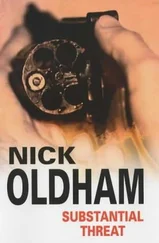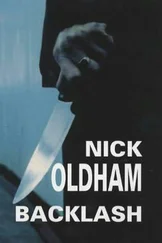The Sergeant let himself in, and the first thing he saw was the boy, sitting in livid silence on the bed in which he had slept, with his back to the door.
THERE WAS NO way of knowing how long the boy had been sitting there. It was theoretically possible that he had only just arrived, or that he had been, until he heard the key turn in the lock, reading quite cosily in the corner chair — but there was an air of self-mortification about him, a sense that he had selected this posture in the knowledge that it would be uncomfortable, and his long wait with aching muscles was part of the bill which would now come due.
The Sergeant knocked on the doorframe, then cleared his throat. When this elicited no response, he experienced a strange, appalling hallucination or imagining: that the boy had died and was slowly freezing in place owing to rigor mortis. He saw himself realising and leaping up, pounding on the boy’s chest like a madman and giving him mouth-to-mouth — much too late — then carrying the tiny corpse in his arms all the way to Beauville, weeping and weeping and weeping and none of it doing any good. And what was the point of that? What was the point of being a soldier, of being a human being in a world which could work wonders with medicine, if affection — he had almost called it love, but that was a presumption, wasn’t it, because the boy wasn’t his flesh, his son, and while that was something which could be negotiated it hadn’t been negotiated, not yet — what was the point of affection, then, if it didn’t exert any traction on the universe? If it didn’t heal or protect or do anything at all except hurt? In his nightmare he begged the Witch to help him and she did, she duped him and sedated him and while he was asleep she made the dead boy disappear and when he came to himself he thanked her and then they never spoke again.
But when he risked a glance, ridiculously frightened that he would this time turn out to be right, he could see the boy’s chest moving, so that much was good. Still, he knew he was the focus of this frigid rage.
It was new ground. They had never fought before. The Sergeant had never fought in that sense with anyone — and if he had, no one had ever before occupied the strange, vexed, desperate space in his life which now belonged to the boy.
So he advanced, slowly, as if probing for mines with his voice.
‘Sorry I wasn’t around. I had to go over to the Xeno Centre.’
The boy’s face remained firmly turned away. If anything, the ramrod back seemed to grow more disdainful. Instinct told the Sergeant that this was not a bad thing; that it amounted, contrary to appearances, to permission to continue.
‘Inoue wanted to tell me some things. And when we got there, there was a sort of. . well, an attack, I suppose. A gang.’
No answer. No shift. Did that mean rejection, or interest? Was it possible that the boy himself did not know? The silence stretched.
‘And I suppose technically I solved the dog thing. I mean, they killed him. Threw him on my car. It’s a mess — you should see.’
No, that was a mistake. Too much, too soon. A hiss of affront. He hurried on.
‘But I’ve got a new case now: the masked men. On quad bikes, if you please. Bloody expensive for Mancreu. Can’t be too many, so I expect I can find them.’ A case you can be part of. A real gang case, pow pow pow. And: I’m sure we talked about this. I’m sure I was allowed.
The boy shrugged, not his usual lazy lift of the shoulders but a hunching dismissal. ‘So you have solved a dead dog. Very good! Very excellent! When it is dropped on you, you do so very good work!’ The voice was shrill, quavering. ‘And in all this where is your friend? Where is my friend? He is still dead! And there are men in jail and you still know nothing! And when you should be looking, where are you? When I am looking, where are you? You are nowhere, except you are not nowhere you are somewhere, but Shola is really nowhere because he is dead and you don’t do anything about it. Which is fine. It is all fine. It is only Mancreu. We understand. Not important for the Brevet-Consul.’ He turned, face in shadow, eyes glaring. ‘Fine. But I thought maybe for your friends. I was wrong.’
‘You weren’t.’
‘I was. Totally. Funny me, ha ha. Ai can haz stupidz.’
‘I just have other things too. The only way I can do what I do is if people let me. I don’t have anything to back me up. And they let me because I don’t just do what suits me. I try to do what needs doing. And Shola. . that does need doing. But it’s not the only thing. I’m sorry. I’ll keep after it, you know I will. He was my friend. And so are you.’
‘Yes! There are so many other things. So I have been helping, while you were so importantly somewhere not here. I have solved your fish case for you. Your thief is Pechorin, from NatProMan.’
The Sergeant sighed. Too late, then, to tell the boy not to go near the Ukrainians. ‘Yes,’ he said. ‘I heard that, too. The card-players told me, in the old town.’
‘Good. So now you find out about Shola.’
‘Yes. Of course. I’ll. .’ But he still did not know what he would do. ‘I’ll chase the weapons. Get names on the men, see if I can find out who hired them. If someone did. I’ll get there, in time.’ And now’s not the time to explain that we may not have very much. Your island is dying, we may never know who murdered your friend: come and be my son. He pushed on. ‘I can interrogate them again. I won’t stop, I promise. Even if you weren’t asking. If you didn’t talk to me any more. I wouldn’t stop. But I’d be. .’ a little part of the full truth, now ‘. . less. I’d be less than I am. And I want to be more.’
The boy seemed to find this funny, somehow darkly amusing, and shook his head. They sat together in silence for a while, and the wind blew around the edges of the house and in through an open window in the other room. It grew noticeably cold. The Sergeant found himself speaking again. He hoped he knew what he was doing, and suspected he didn’t.
‘I don’t know how to be what you need. I want to. But that sort of thing I always. . well, I asked Shola. He was good with people. He was a good man. Me, I’ve. . got no practice. I’m used to having instructions. I’m not like you. I don’t. . I don’t have the habit of it yet, the natural way of doing it without orders. But I’ll get there. I’ll learn’ — and here inspiration struck — ‘I’ll learn to be a bit like him. Shola didn’t work for anyone.’
The boy jerked away, and his face reflected absolute horror. It must be a flashback, the Sergeant thought, full Dolby surround sound with all the trimmings, and yes, oh, yes, he knew about those. He moved forward, hands out to receive a faint or fend off an attack. The boy opened his mouth and made a high keening sound like the first flurry of bagpipes when the piper settles them under his arm. He stopped, eyes wide, and then made the noise again and again until it tailed away into a gasping cough, then flung himself on the Sergeant and clung to him, and the older man realised abruptly that this noise was grief, and maybe even shame.
The Sergeant sat for a moment with his elbows at shoulder height and his hands in the air, as if someone notionally friendly had him at gunpoint and it would all be sorted out in a moment. Then, with great caution, he lowered his nearer arm and put it around the boy’s back and wrapped the other across so that he could clasp his own wrist and complete the circle in a hug. He rocked gently, and made wordless noises of encouragement. From the boy came back squalls of sorrow and remorse. Shola’s death, the Sergeant gathered, was somehow all to be laid at the boy’s small feet. Shola had been coming to rescue him. They had killed Shola because Shola had told them to leave the boy. The boy had done nothing to help. He had watched Shola die and done nothing. What sort of hero would let that happen? The Sergeant had been like lightning. He had been a god. He had been a warrior. He had been like Batman, but a thousand times better because Batman was ultra wealthy and the Sergeant was just an ordinary person. The boy had done nothing. The whole affair was his fault. The boy was bad.
Читать дальше
Конец ознакомительного отрывка
Купить книгу











